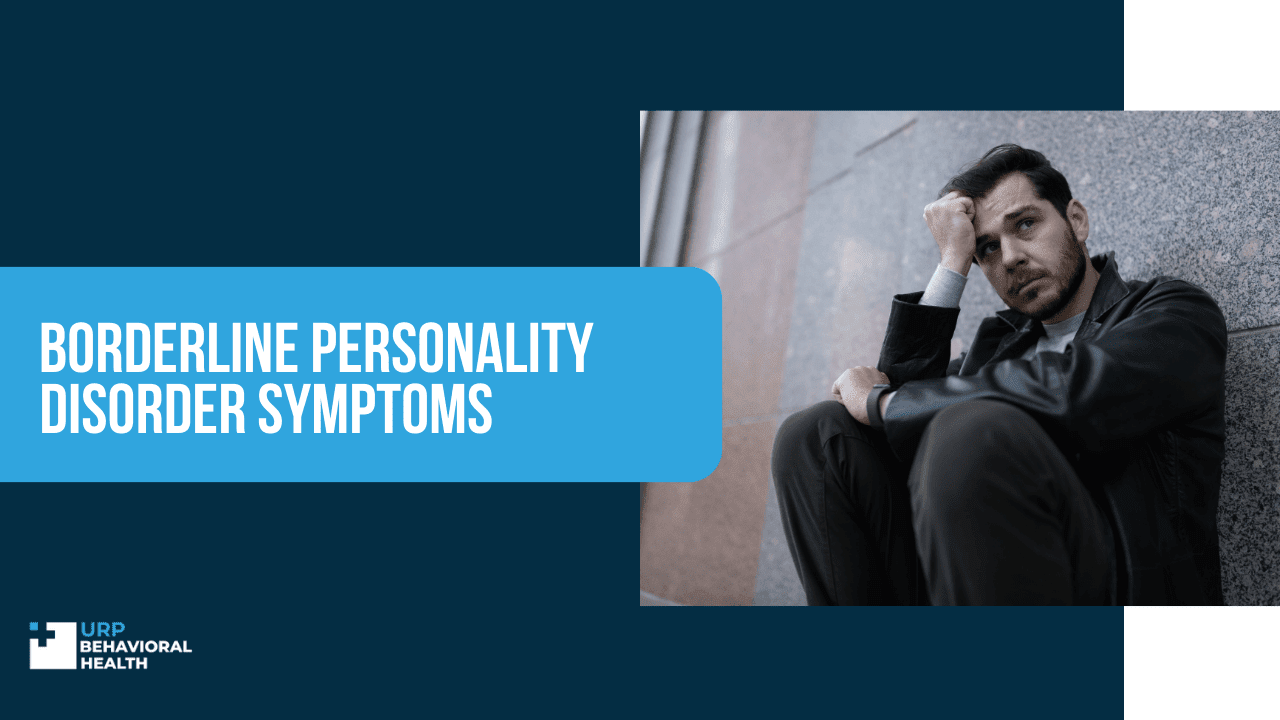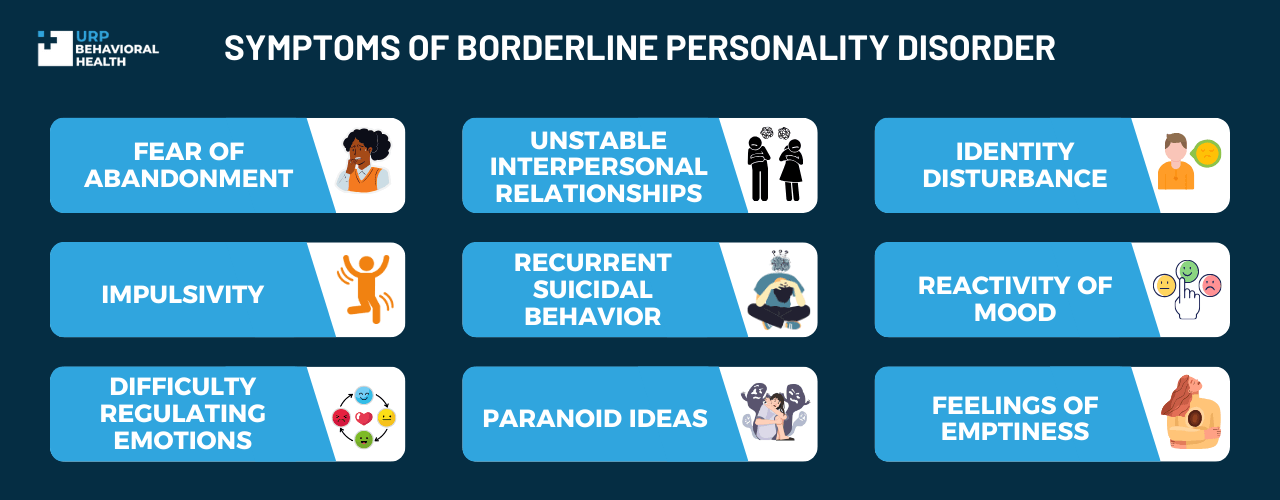Symptoms of Borderline Personality Disorder (BPD)

Studies estimate that borderline personality disorder affects about 1.6 percent of the general population, with a majority of this group being women. But despite its low prevalence, it can have a detrimental impact on one’s life and relationships. Because the condition isn’t as common as, say, anxiety or depressive disorders, mental health practitioners may have little exposure to it.
Consequently, it’s at risk of being misdiagnosed, especially since it involves symptoms like depressed feelings and unstable mood. Similarly, a lack of awareness about borderline personality disorder can lead you to believe that you or a loved one struggles with something else. So, it’s worth taking a look at its symptoms and understanding possible treatment options.

What is Borderline Personality Disorder?
Borderline personality disorder falls under the category of cluster B personality disorder. These involve showing dramatic, unpredictable, or highly emotional responses to distressing events. BPD’s defining feature is a pervasive pattern of unstable relationships, mood, and self-image. It’s marked by impulsivity that is present in different contexts and begins in early adulthood.
If you ever encountered a person with BPD, you’d find them to be very sensitive. This causes them to show intense reactions to small things. Once they’re upset, it can be difficult to calm them down. This creates a recipe for unstable relationships.

Symptoms of Borderline Personality Disorder
According to the fifth edition of the APA’s DSM, there are nine symptoms of borderline personality disorder. For a diagnosis, you must experience at least five of the following BPD symptoms in a variety of contexts.

Fear of Abandonment
When you have BPD, you have an overwhelming fear of abandonment and make frantic efforts to prevent someone from leaving. This fear also manifests as a perception of impending rejection or separation, which causes major changes in your self-image, mood, and behavior. Things like a romantic partner having to go away for the weekend or a sudden change in plans can lead to inappropriate anger.

Unstable Interpersonal Relationships
A feature of unstable and intense relationships is that you fluctuate between idealizing and devaluing romantic partners or caregivers. For instance, you may idealize them at the first meeting but devalue them when you feel like they don’t care enough. When you’re prone to erratic and dramatic shifts in how you view other people, you go from seeing them as loving to cruel.

Identity Disturbance
A common marker of BPD is identity disturbance, characterized by an unstable self-image. You may have sudden shifts in self-image, signaled by changing vocational aspirations, values, and goals. Your opinions and plans about your values, career, or sexual orientation may change suddenly. At times, you may experience a complete absence of a sense of self, which typically happens when you feel a lack of nurturing and support.

Impulsivity
Another symptom of BPD is that you show impulsivity in two areas that can be self-damaging. This includes actions like driving recklessly, engaging in unsafe sex, spending money irresponsibly, or substance abuse.

Recurrent Suicidal Behavior
Criterion 5 includes recurrent suicidal behavior, including gestures and threats or self-harming behavior. At the same time, the rate of completed suicide is 8 to 10 percent, and self-harming behaviors like cutting and burning, as well as suicide attempts, are common. In most cases, recurrent suicidality is the reason people with BPD need help.

Reactivity of Mood
A common sign of BPD is mood instability, which leads to anxiety, irritability, or intense feelings of unease and dissatisfaction that only last a few hours to a few days. When you have BPD, your mood is generally low but is interrupted by periods of panic, danger, or despair, which indicates your extreme reactivity to stressful events.

Difficulty Regulating Emotions
A major symptom of BOD is a failure to regulate your emotions. This can cause you to express inappropriate, intense anger that’s out of proportion to the situation. Similarly, you may show bitterness, use sarcasm, and have verbal outbursts. These reactions occur when caregivers or romantic partners seem neglectful or uncaring.

Paranoid Ideas
During highly stressful situations, you may experience dissociative symptoms or feel suspicious. Dissociation feels like you’re losing touch with reality as if you’re seeing the world from outside your body. Similarly, paranoid ideation or suspicious thoughts about others’ intentions is common.

Feelings of Emptiness
People with BPD often experience chronic feelings of emptiness. Consequently, you may feel like you get bored easily and look for something to do. This can include binge eating, abusing illicit substances, or consuming excessive amounts of alcohol.

Treatment Approaches
Cognitive Behavioral Therapy (CBT)
CBT is helpful for treating BPD because it focuses on changing how you perceive situations as a way to alter your behavior. These negative thoughts are called cognitive distortions, so CBT can reframe these thoughts to make symptoms manageable. Besides cognitive restructuring, your therapist may also help you set SMART goals and build skills to manage negative thoughts.
Psychotherapy
- – Dialectical Behavior Therapy (DBT) is a type of psychotherapy that’s based on the principles of CBT but is specialized for people with BPD. The purpose of DBT is to help you develop four skills: mindfulness, interpersonal effectiveness, distress tolerance, and emotional regulation. With these skills, you can manage intense and unstable emotions and cope with stressful situations that would otherwise elicit inappropriate responses.
- – Mentalization-based therapy is another form of psychotherapy developed for people with BPD. It teaches you to be more conscious of your feelings and empathetic towards other people. During therapy sessions, you’ll work with your practitioner to explore your emotions and consider other explanations for negative interactions with people.
Medication
Currently, there are no medications formulated to treat the condition itself. However, practitioners may prescribe medication to address symptoms associated with BPD, such as anxious thoughts and depression. For instance, they may prescribe antidepressants to alleviate your depressed mood and make you more responsive to psychotherapy.
Holistic Approach Through Inpatient Treatment
Another option is to enroll in a residential treatment program, which employs a holistic approach to treating disorders. Here, you’ll receive evidence-based therapies, as well as complementary treatments, in a comfortable environment – far away from potential stressors. During the program, you can build new skills and receive the support you need, improving your chances of recovery.
Let Us Guide you Towards Healing
We know that seeking treatment can be overwhelming, but our staff is here to make the process as smooth as possible. We’re available 24/7 to address any questions or concerns you may have.

